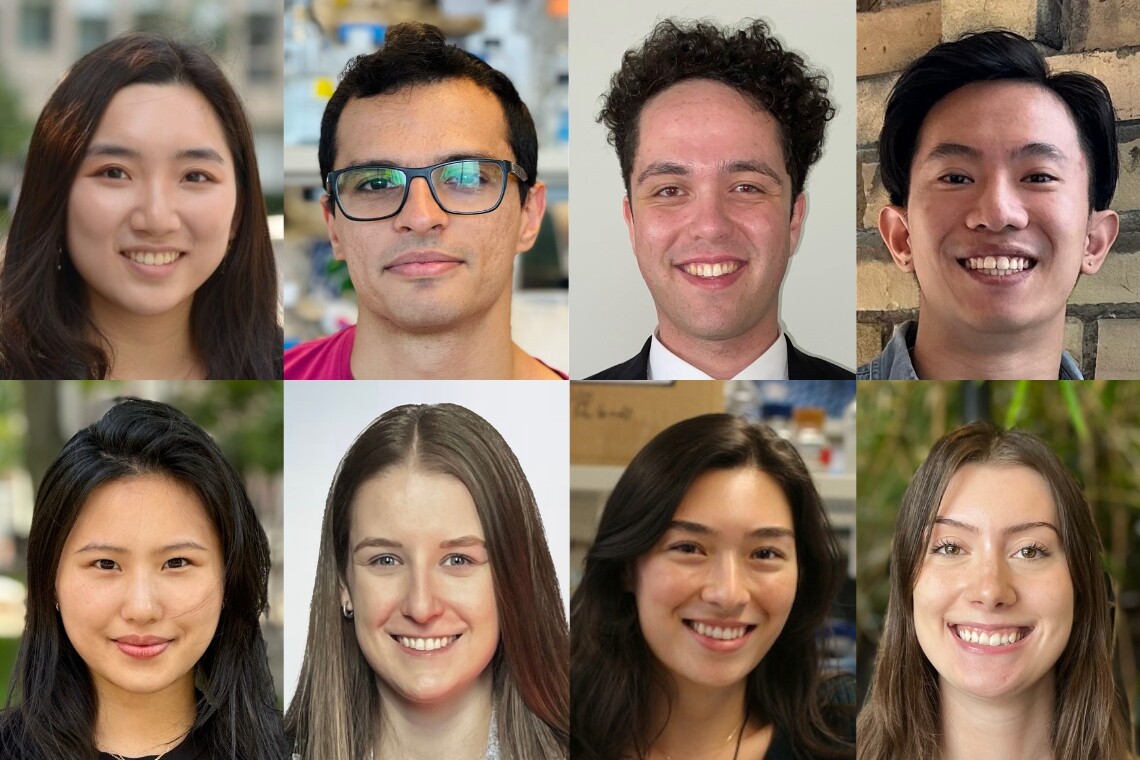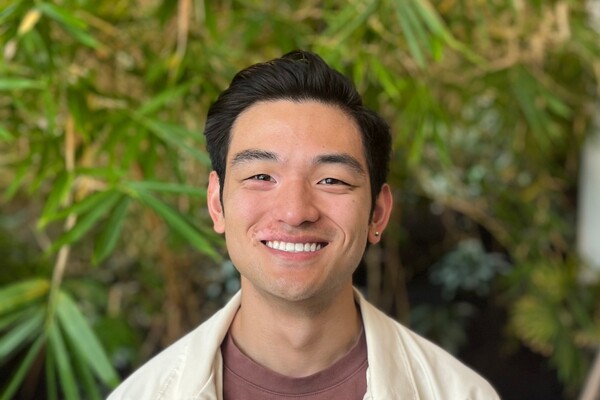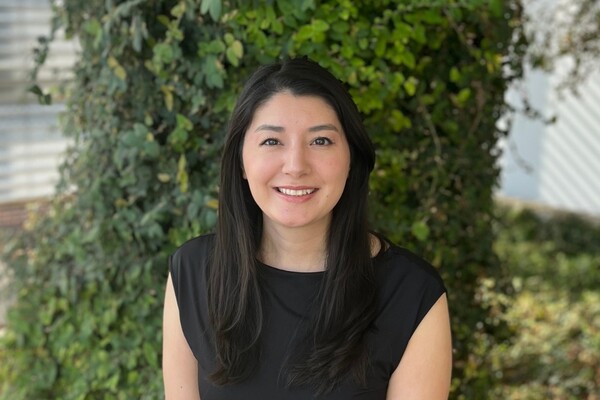Main Second Level Navigation
2023 Yip Award Recognizes Early-Career Graduate Students Investigating Treatments for Cancer, Autism and Spinal Cord Injury

The Donnelly Centre for Cellular and Biomolecular Research recognizes outstanding new graduate students each year with the Cecil Yip Doctoral Research Award. Recipients of the award represent the innovative and collaborative spirit of the Donnelly Centre, upholding the Centre’s principle of working across disciplines to solving the biggest challenges in human biology. The recipients of the 2023 Cecil Yip Doctoral Research Award are Atta Chang, Ali Fathi, Jacob Fine, David Li, Olivia (Xiang) Li, Mackenzie Moore, Chloe Reno and Olivia Taverniti.
The award provides financial support to first-year doctoral-stream students. It was established by the family of the late Cecil Yip, who was former Vice-Dean of Research in the Faculty of Medicine and a co-founder of the Donnelly Centre.
“On behalf of the Yip Doctoral Award committee, I congratulate this year’s recipients,” said Christopher Yip, Dean of the Faculty of Applied Science and Engineering, chair of the Cecil Yip Doctoral Research Award selection committee and son of Cecil Yip. “While it’s still early in their graduate careers, these students have already shown impressive promise and progress in their research programs. I have no doubt that they will make significant contributions to their respective labs and will certainly inspire the next generation of interdisciplinary researchers in medicine and health.”
“On behalf of the Yip Doctoral Award committee, I congratulate this year’s recipients. While it’s still early in their graduate careers, these students have already shown impressive promise and progress in their research programs. I have no doubt that they will make significant contributions to their respective labs and will certainly inspire the next generation of interdisciplinary researchers in medicine and health.”Christopher Yip, Dean of the Faculty of Applied Science and Engineering
Improving Nanoparticle Treatment of Tumours Through Simulation
Atta Chang is conducting research under the supervision of Warren Chan, distinguished professor of nanobioengineering. Chang plans to investigate how nanoparticles interact with their tumour microenvironments. The retention of nanoparticles in tumours remains a challenge in the field of cancer nanomedicine; Chang will address this challenge by building a mathematical model to simulate nanoparticle retention based on where nanoparticles are distributed within tumours and how they interact with the tumour. The goal is for this model is to help identify the factors that have the greatest impact on nanoparticle retention in tumours. Chang hopes her findings will help improve nanoparticle design for targeted cancer treatment.
Exploring the Binding Process of Transcription Factors
Ali Fathi is conducting research under the supervision of Timothy Hughes, Billes Chair of Medical Research. Fathi is developing a robust model to help elucidate how transcription factors bind to specific DNA sequences to control gene expression. He will accomplish this by combining different computational methods that represent all aspects of binding by transcription factors, which need to be accounted for to paint a clear picture of how transcription factors recognize and choose the DNA sequences they bind to. Fathi’s findings will help determine the binding mechanisms, and thereby their impact on gene regulation, for around a quarter of identified human transcription factors that remain a mystery.
Identifying Gene Regulatory Mechanisms Involving Differential Codon Bias
Jacob Fine is conducting research under the supervision of Benjamin Blencowe, Banbury Chair in Medical Research. Fine’s research involves the development and application of computational, statistical and biomolecular methods to examine sequence features in the cis-regulatory code that impacts gene expression. He is analyzing large repositories of RNA sequencing data to identify gene regulatory mechanisms that utilize codon usage bias. Using the bioinformatic tools he has developed, Fine has uncovered evidence of new interrelationships between codon optimality, alternative splicing and gene expression in mammalian cells.
Improving Spinal Cord Injury Treatment Through Timed Drug Delivery
David Li is conducting research under the supervision of Molly Shoichet, university professor of chemical engineering and applied chemistry. In collaboration with the Fournier lab at McGill University, Li plans to synthesize a hydrogel-based release system for the timed co-delivery of a biomolecule to treat glial scars and a drug that promotes axon growth. The biomolecule, chondroitinase ABC, breaks down glial scars that form after injuries to the central nervous system. The Shoichet lab has designed a more thermally stable version of this biomolecule for affinity-based release in a hydrogel. Li aims to improve drug delivery methods for injuries to the central nervous system by increasing controllability and minimizing how invasive the treatment is to the patient. A hydrogel is capable of doing just that as it can be resorbed or injected into a patient. This research is part of an initiative called Mend the Gap, which involves 12 institutions around the world working to treat spinal cord injuries.
Developing an Injectable Hydrogel to Treat Scarring from Spinal Cord Injury
Olivia (Xiang) Li is conducting research under the supervision of Molly Shoichet, university professor of chemical engineering and applied chemistry. Li is working to advance the development of an injectable hydrogel that will deliver antifibrotic drugs to spinal cord injury sites; this is another project from the Shoichet lab that is part of the Mend the Gap initiative. Fibrotic scarring from injuries to the spinal cord, which results in the proliferation of connective tissue, can prevent neurons from regenerating. Li will test two antifibrotic drugs: one that naturally self-assembles into concentrated groups of molecules that are suspended in solution, and another that must be chemically modified to do so. She will determine if either can successfully achieve sustained release to treat spinal cord lesions.
Exploring the Role of Nuclear Organization in Neural Microexon Splicing
Mackenzie Moore is conducting research under the supervision of Benjamin Blencowe, Banbury Chair in Medical Research, and Sabine Cordes, professor of molecular genetics and senior investigator at the Lunenfeld-Tanenbaum Research Institute. Moore plans to explore the impact of a neural-specific splicing factor called SRRM4: a master regulator of the splicing of neuronal microexons that are often misregulated in autism spectrum disorder. In collaboration with Warren Winick-Ng, research associate in the Blencowe lab, and Ana Pombo, professor at Humbolt University of Berlin and group leader of the Pombo lab at the Max Delbrück Center for Molecular Medicine, Moore will investigate how spatial organization within the nucleus helps coordinate the splicing of SRRM4-dependent microexons. After pinpointing the developmental stage at which a deficiency of SRRM4 is critical, she will harness a self-regulating SRRM4 delivery system to correct neuronal function. Moore hopes to unlock the potential of SRRM4 in therapeutic strategies for neurodevelopmental disorders, including autism spectrum disorder.
Developing Treatments for Genetic Diseases Through Induced Proximity
Chloe Reno is conducting research under the supervision of Mikko Taipale, associate professor of molecular genetics, and Frederick Roth, professor of molecular genetics. Reno plans to make use of a technique called induced proximity to activate and recruit proteins to the disease variants of genes, with the goal of putting a stop to gene misregulation. This technique entails bringing two molecules close enough to each other to increase the reactivity between them. By combining induced proximity with Barcode Fusion Genetics, Reno aims to systematically screen thousands of known coding variants within disease-associated proteins against the human proteome. If successful, Reno will have developed a system to catalogue disease variants of genes and how to treat them at an unprecedented scale.
Identifying Metabolic Vulnerabilities in Treatment-Resistant and Recurrent Cancers
Olivia Taverniti is conducting research under the supervision of Rafael Montenegro Burke, assistant professor of molecular genetics. Taverniti will use liquid chromatography-mass spectrometry to identify metabolic changes that accompany cancer recurrence. By profiling the metabolites and lipids present in various tumor cell types, including both primary and recurring tumors from the same patient, she will determine which specific metabolic pathways are associated with recurrence, and if inhibiting these pathways will mitigate treatment resistance. Taverniti aims to establish a relationship between cell metabolism and cancer recurrence for the development of more effective therapies.
News



